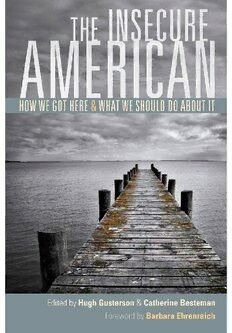Table Of ContentThe Insecure American
This page intentionally left blank
The Insecure American
How We Got Here and What We Should Do about It
Edited by
Hugh Gusterson
and Catherine Besteman
Foreword by Barbara Ehrenreich
UNIVERSITY OF CALIFORNIA PRESS
Berkeley Los Angeles London
University of California Press, one of the most distinguished university
presses in the United States, enriches lives around the world by advancing
scholarship in the humanities, social sciences, and natural sciences. Its
activities are supported by the UC Press Foundation and by philanthropic
contributions from individuals and institutions. For more information,
visit www.ucpress.edu.
University of California Press
Berkeley and Los Angeles, California
University of California Press, Ltd.
London, England
© 2010 by The Regents of the University of California
Every effort has been made to identify and locate the rightful copyright
holders of all material not specifically commissioned for use in this pub -
lication and to secure permission, where applicable, for reuse of all such
material. Credit, if and as available, has been provided for all borrowed
material either on-page, on the copyright page, or in an acknowledgment
section of the book. Errors, omissions, or failure to obtain authorization
with respect to material copyrighted by other sources has been either
unavoidable or unintentional. The author and publisher welcome any
information that would allow them to correct future reprints.
Library of Congress Cataloging-in-Publication Data
The insecure American / edited by Hugh Gusterson and Catherine
Besteman.
p. cm.
Includes bibliographical references and index.
isbn978-0-520-25969-0 (cloth : alk. paper)—isbn978-0-520-25971-3
(pbk. : alk. paper)
1. United States—Politics and government—21st century. 2. United
States—Social conditions—21st century. 3. Security (Psychology)—
United States. 4. Nationalism—United States. I. Gusterson, Hugh.
II. Besteman, Catherine Lowe.
jk275.i57 2010
973.93—dc22 2009015363
Manufactured in the United States of America
19 18 17 16 15 14 13 12 11 10
10 9 8 7 6 5 4 3 2 1
This book is printed on Cascades Enviro 100, a 100% post consumer waste,
recycled, de-inked fiber. FSC recycled certified and processed chlorine free.
It is acid free, Ecologo certified, and manufactured by BioGas energy.
To Stanley Ann Dunham
This page intentionally left blank
Contents
Foreword by Barbara Ehrenreich ix
Acknowledgments xiii
Introduction 1
Catherine Besteman and Hugh Gusterson
Part one. Fortress America
1. A Nation of Gated Communities 27
Setha M. Low
2. Warmaking as the American Way of Life 45
Catherine Lutz
3. Republic of Fear: The Rise of Punitive Governance in America 63
Roger N. Lancaster
Part two. The New Economy
4. Neoliberalism, or The Bureaucratization of the World 79
David Graeber
5. The Age of Wal-Mart 97
Jane L. Collins
6. Deindustrializing Chicago: A Daughter’s Story 113
Christine J. Walley
7. Racism, Risk, and the New Color of Dirty Jobs 140
Lee D. Baker
Part three. Insecurity as a Profit Center
8.Normal Insecurities, Healthy Insecurities 163
Joseph Dumit
9.Cultivating Insecurity: How Marketers Are Commercializing
Childhood 182
Juliet B. Schor
Part four. The Most Vulnerable
10.Uneasy Street 207
T.M. Luhrmann
11.Body and Soul: Profits from Poverty 224
Brett Williams
12.Useless Suffering: The War on Homeless Drug Addicts 238
Philippe Bourgois
13.Walling Out Immigrants 255
Peter Kwong
Part five. Insecurity and Terror
14.Compounding Insecurity: What the Neocon Core Reveals
about America Today 273
Janine R. Wedel
15.Deploying Law as a Weapon in America’s War on Terror 292
Susan F. Hirsch
Part six. Insecurities of Body and Spirit
16.Death and Dying in Anxious America 317
Nancy Scheper-Hughes
17.Get Religion 345
Susan Harding
List of Contributors 362
Index 367
Foreword
Fifty or sixty years ago, the word insecuritymost commonly referred to a psycho-
logical condition. Some people suffered from “insecurities”; otherwise, though,
Americans were self-confident to the point of cockiness. Public intellectuals wor-
ried over the “problem” of affluence, which was believed to be making us too soft
and contented. They held forums to consider the growing challenge of leisure, never
imagining that their own children and grandchildren would become accustomed
to ten-hour workdays. Yes, there remained a few “social problems” for sociologists
to study—poverty, which was “discovered” by the nonpoor in the early sixties, and
racial inequality—but it was believed that these would yield easily to enlightened
policies. We were so self-confident that Earth itself no longer seemed to offer suffi-
cient outlets for our energy and ambition. We embarked on the exploration of space.
It was at some point in the late 1960s or early 1970s that Americans began their
decline from intrepid to insecure. The year 1969 brought the revelation of the mas-
sacre at My Lai and the certainty that the Vietnam War would end in disgrace as
well as defeat. At the same time, the war was draining federal funds from Lyndon
Johnson’s Great Society programs, vitiating health services and hundreds of com-
munity development projects. Then 1970 saw the first national observance of Earth
Day and the dawning awareness that our environmental problems went beyond scat-
tered cases of “pollution.” For the first time since Malthus, the possibility was raised
that we might someday exhaust the resources required to maintain America’s profli-
gate consumer culture.
American business, beginning with the auto industry, woke up, in the 1970s,
to the threat of international competition and initiated its long campaign to re-
duce both wages and the number of American workers. By the 1980s, big business
ix

